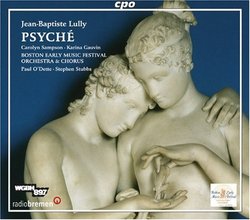| All Artists: Jean-Baptiste Lully, Paul O'Dette, Stephen Stubbs, Boston Early Music Festival Orchestra, Carolyn Sampson, Karina Gauvin, Amanda Forsythe, Olivier Laquerre, Jose Lemos, Mireille Lebel Title: Jean-Baptiste Lully: Psyché Members Wishing: 1 Total Copies: 0 Label: CPO Original Release Date: 1/1/2008 Re-Release Date: 7/29/2008 Genre: Classical Styles: Opera & Classical Vocal, Historical Periods, Baroque (c.1600-1750), Early Music, Modern, 20th, & 21st Century, Symphonies Number of Discs: 3 SwapaCD Credits: 3 UPC: 761203736720 |
Search - Jean-Baptiste Lully, Paul O'Dette, Stephen Stubbs :: Jean-Baptiste Lully: Psyché
 | Jean-Baptiste Lully, Paul O'Dette, Stephen Stubbs Jean-Baptiste Lully: Psyché Genre: Classical |
Larger Image |
CD Details |
CD ReviewsO'Dette & Stubbs strike gold once again. wolfgang731 | 08/07/2008 (5 out of 5 stars) "Just like they did with last year's Thesee, O'Dette, Stubbs and the Boston Early Music Festival Orchestra & Chorus strike gold once more with Lully's PSYCHE. Though hardly as well known as some of Lully's later successes, it is, nevertheless, first rate Lully. And even though the cast is comprised largely of American and British (with a smattering of French-Canadian) singers, they, for the most part, imbue their singing with not only period sensibilities but also a Gallic refinement, with more than respectable French pronunciation. No doubt a native French speaker would disagree with me, but as someone who speaks the language, I found it an honorable effort on everyone's part. O'Dette and Stubbs direction is really fantastic, with an unerring attention to dynamics and phrasing. The music ebbs and flows with just the right amount of urgency and delicacy. The percussion and trumpets were appropriately regal and bold without overwhelming the woodwinds and strings. Carolyn Sampson is, not surprisingly, outstanding in the principal role of Psyche, but she is not, by any means, the only stellar singer here. My one complaint would have to be Jose Lemos's Silene. His countertenor voice is not the purest I've heard, with a distinct vibrato and somewhat "white" tone that I found to be a bit grating, though his tasteful musicality more than compensates for the lack of tonal vocal quality. This is really too minor a thing to even take into serious consideration. I mention it strictly in passing. If you love baroque opera, or more specifically French baroque opera, you will find little to gripe about here. I've already listened to it three times and could very easily listen to it just as many times again." A feast for gods and mortals too F. A. Harrington | Boston MA | 08/25/2008 (5 out of 5 stars) "Psyché was not only the highlight of last year's Boston Early Music Festival but one of the highlights of Boston's year in music altogether. This was a very ambitious production with dozens of singers, dancers and musicians, with dozens more behind the scenes to produce an elaborate historically minded production. Although you mat be drawn to the star singers and music directors this recording demonstrates the highest level of musicianship from top to bottom. Karina Gauvin and Carolyn Sampson, the two star sopranos in question, certainly deliver in the lead roles but all the singers excel, and the chorus too. The orchestra, led by the lutenist team of Paul O'Dette and Stephen Stubbs, along with Richard Mealy from the King's Noyse, is just fantastic. Lully's bright and festive music is given a detailed but never fussy or clinical treatment. The festival itself was called "A Feast of the Gods" and there is plenty for you mere mortals to feast on here. Fans of Lully and the French Baroque in general will know what to expect and explorers will be well rewarded. Very highly recommended, along with the other BEMF recordings.Johann Georg Conradi: AriadneLully - Thésée " Another performance with Stubbs and O'Dette worth getting Zaida | Bremerton, WA | 08/13/2008 (5 out of 5 stars) "After the many disappointing recordings of Baroque and Classical operas by American groups, I had reservations about buying this, or the earlier recording of Thésée. Anyway, I went to a local record shop (Silver Platters, if you happen to be from Seattle), to look for this recording of Psyché. They were sold out, and I ended up getting Thésée instead. This was a year after that recording was released, and, as it turns out, I shouldn't have waited that long to get it, for my fears were in vain. Anyway, I bought this one not long after, and it is just as well performed. The only problem it has is the fact that as far as plot, it ranks near the bottom of Lully's output, for the libretto is a hash of certain parts by Corneille, some from Lully's earlier ballet by the same name, some by Lully's usual librettist, Quinault. Perhaps the best parts are the prologue and the Italian lament in the first act. But, like Isis, that other less than dramatic Lully opera (and the reason why this one doesn't have a libretto by Quinault), it has excellent music throughout, as you would expect from Lully."
|
